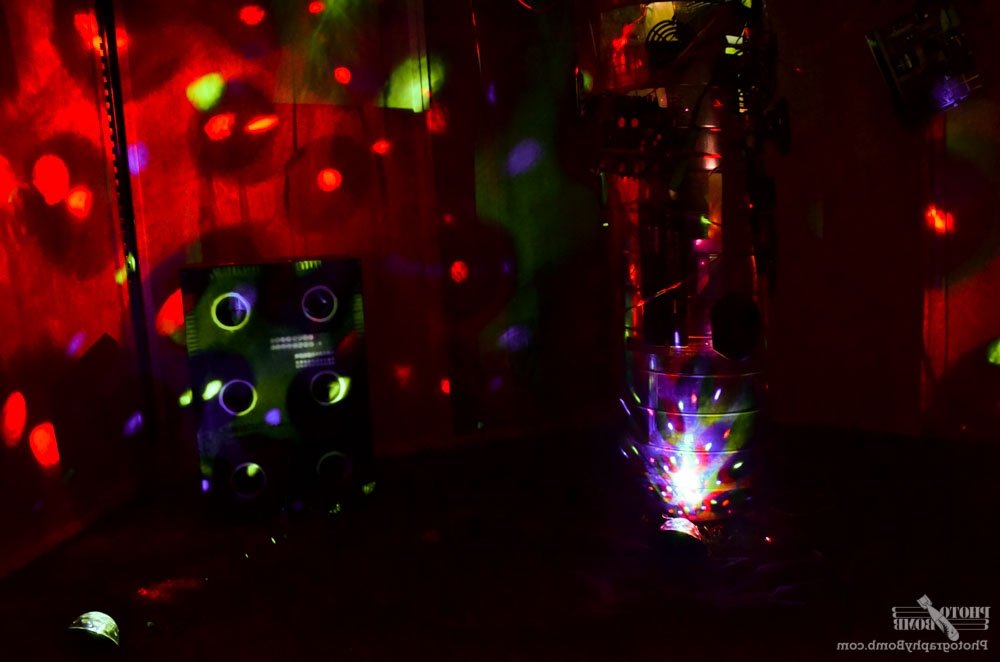The experiment - Multi-room immersive game
The A.I. mainframe
The Experiment (formerly known as Breaking Protocol) was a project by Brownian Motion that pushed the bounds of interactive media. We were inspired by escape rooms to create an immersive experience that blurred the boundary between performance art, games, and real life. Unlike escape rooms, though, puzzles were directly tied to a scripted plot and an unraveling mystery. The overarching theme gave players the choice to trust an artificial intelligence or its human creator (and discover who the true hero or villain was).
We ran The Experiment for 2 years and had 4 iterations at different community events. All versions of the game had activities that were designed to engage participants' motivation through story-telling. Players were incentivized to solve increasingly challenging puzzles by being rewarded with more details of the story. We designed the environment and puzzles to have visual, auditory, and tactile engagement, and many of the challenges required group collaboration.
We modified each version in response to user feedback, and we also made improvements to streamline our own set up and maintenance. Later versions were more self-sustaining and autonomous, and so we had to create clearer signs to direct the players without our intervention.
Version 1: lakes of fire 2015
Sketchup model of the 5 rooms by Theresa Carranza
Aerial view: Frame of the 5 rooms and scene props
In our original version, we set up four sequential rooms for the players, and a control room for our team. We installed one-way mirrors so that we could monitor and interact with the players as they progressed.
To enter the installation, passersby were first invited by friendly scientists, dressed in lab coats, into a non-descript building and asked if they wanted to participate in an experiment. Once they consented and entered, they were left alone with instructions to perform some research-like group challenges. However things quickly escalated when they were suddenly contacted via walkie-talkie by an alarmed professor claiming that things were not as they seemed, and the real game began.
Throughout the levels, players interacted with two live characters: an A.I., which they communicated with through computer terminals, and its human creator, the professor who contacted them through the walkie-talkie. They were constantly faced with the decision of which character to trust, and they made their choice clear by choosing different puzzles to solve.
Participants always had the choice to exit the game through the entrance, or they could dive deeper into the mystery by solving puzzles to break into subsequent rooms. Here is the flow chart of decisions and consequences.
Elements:
Five rooms: four levels and one control room
Gripping storyline and plot twists
Communication with live actors
Group challenges
Electromechanical puzzles
Digital puzzles







version 2: ann arbor art center
We were invited to the Ann Arbor Art Center to showcase The Experiment.
We made this version more self-sustaining and with less need for our intervention, so we scaled down to only two rooms: the A.I. room and the Professor's room. Instead of progressing through levels, participants could move freely between the two rooms.
New elements:
Two rooms and an open area in between
Thematic soundscapes and voice recordings
Communication between the two rooms to solve puzzles
Open format, no level progression, but the mystery still needed to pieced together.
version 3: maker faire @ ann arbor district library
We presented the third version at the Ann Arbor District Library for Maker Faire.
This version was similar to the second, but we had people use their smartphones to enter information into an online app. Once they solved the puzzles, the answer to the mystery was revealed on their phones.
New Elements:
Interactivity through an online app
A phone line between the two rooms to solve a puzzle
Player stats projected on a screen in the A.I. room
Painted exterior
Online app and player stats
The two rooms from the outside
version 4: Lakes of fire 2016
In our final version, we brought the two rooms back to Lakes of Fire. In this version we upgraded the puzzles and added more lighting, such as pulsing UV light in the A.I. room to simulate breathing.
New elements:
Upgraded puzzles
Upgraded decor










